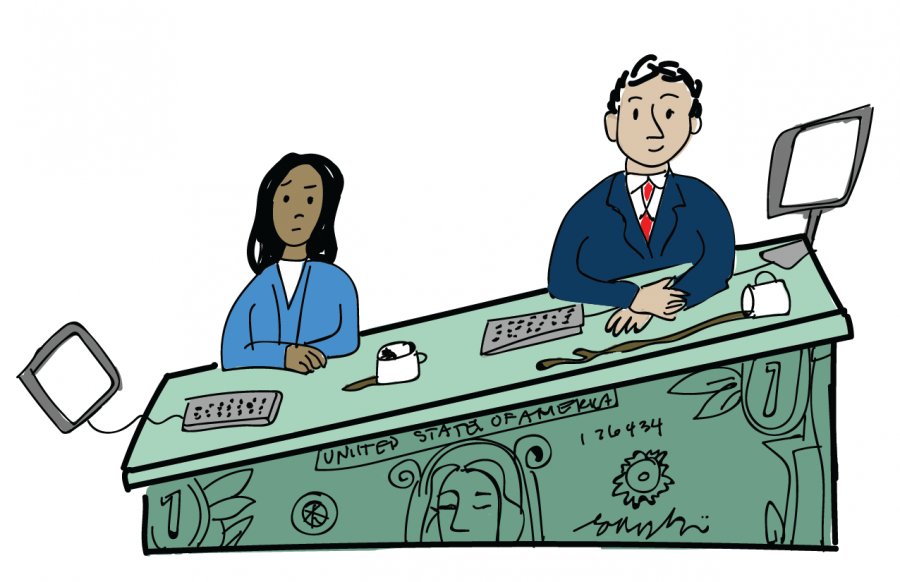Filling in the (pay) gap
Yes, men earn more money than women. No, it’s not okay.
Statistically, men are known to earn more money than women.
Why is it that a woman who shares the same exact educational background, same position at her job, and same amount of hours as a man, according to the Bureau of Labor Statistics, only earns 82 cents to a man’s dollar?
Not only is this a horrific statistic in itself, but it also says a lot about the lack of progression in women’s basic rights. A person’s gender should not determine his/her salary.
Around 50 years ago, President John F. Kennedy signed the Equal Pay Act, to ensure that women get paid the same as men for equal work. Even after this historical movement, the pay gap has barely budged.
I believe the wage gap’s existence comes down to sex discrimination. There is a bias in hiring and promoting women to be the face of a company, a prejudice against mothers and a belief that women are not as capable at carrying out employment like men.
If you argue that men are the ones who financially provide for the family so they should automatically be granted a higher pay, let’s go back in history.
The wage gap began in the early 1900’s when women were banned from certain jobs. Even then, women weren’t paid the same amount because women’s work was seen as illegitimate. Since women were deprived of a basic education, they were restricted from being employed in a decent job, which caused them to resort to jobs that paid less.
I continue to see this in our society today. According to Catalyst.org, 4.4 percent of the CEOs in S&P 500 companies are women. These companies are stock markets based on 500 large companies listed in the New York Stock Exchange, which is considered the largest exchange in the world.
However, according to the Center for American Progress, in 63.9 percent of the families in the US, a mother brought home a quarter of the families earnings. I’m going to let you in on a little secret– women also bring home money to care for their family too.
“To every woman who gave birth, to every taxpayer and citizen of this nation, we have fought for everybody else’s equal rights,” said actress Patricia Arquette at the 2014 Oscars. “It is our time to have wage equality once and for all, and equal rights for women in the United States of America.”
The wage gap is much worse for women of color. According to the AAUW (American Association of University Women), Hispanic women earn 54% of a white man’s earnings and African-American women earn 62 percent.
I’m a hard-worker. I work to reach my goals and I won’t stop until I accomplish them. But, the reality that I’ll still earn a little over half of what my male colleagues receive makes me more angry. I understand that there is a hierarchy of positions at work, and that there will be a salary difference between various positions. But if a man and I attend the same kind of college, receive the same grades and have the same number of kids (because your job takes that into account too), it’s cruel that I still get lower pay.
To put things into perspective, assuming that a white man and black woman work Mon-Friday from 9 a.m to 5 p.m., by Thursday at midnight to 5 p.m. Friday, a white man would be paid for his work while a black woman would be working for free.
On a larger scale, the wage gap varies around the world. In Louisiana, the average earning of a white woman is 66 percent to that of a white man. That percentage as we’ve seen decreases if you’re African-American or Hispanic. According to CNN Money, Italian women don’t even earn half of what their men earn. However, women in Denmark earn the same amount and sometimes even more than men (the difference is about 2 percent). See, Denmark gets it.
In total, a full-working woman would lose around $431,000 a year because of the gender pay gap.
This has to change. We, as a conclusive whole must provide more opportunities for women to be employed for higher-paying jobs, increase the amount affordable child-care, and ultimately raise the minimum wage. Women should be treated with an equal amount of respect in and out of the workplace.
Every dollar matters. Every woman matters.





